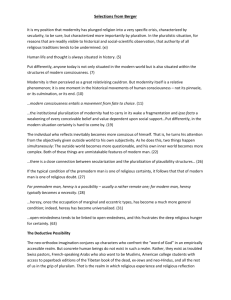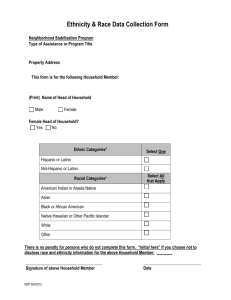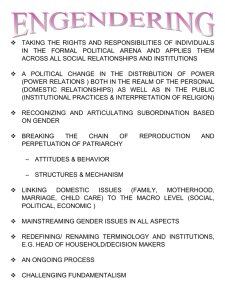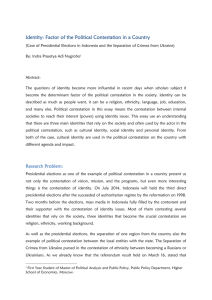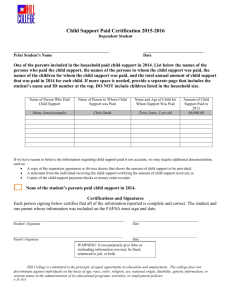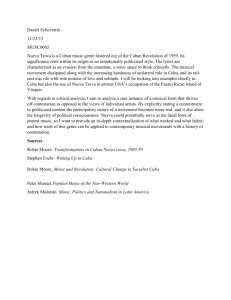doc
advertisement
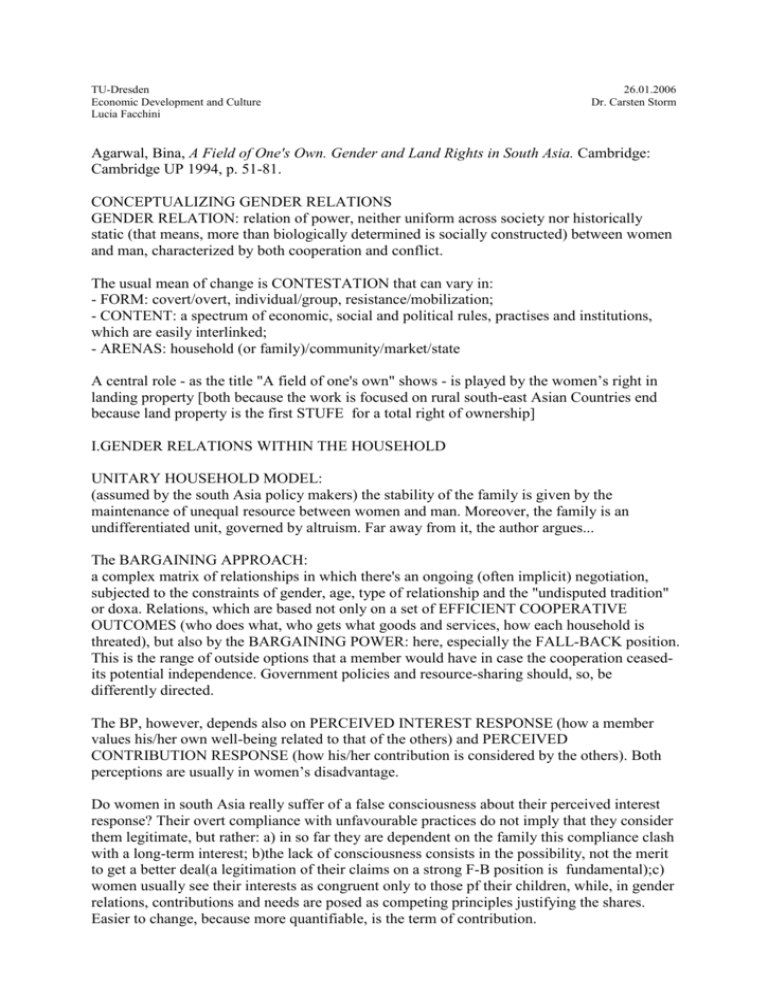
TU-Dresden Economic Development and Culture Lucia Facchini 26.01.2006 Dr. Carsten Storm Agarwal, Bina, A Field of One's Own. Gender and Land Rights in South Asia. Cambridge: Cambridge UP 1994, p. 51-81. CONCEPTUALIZING GENDER RELATIONS GENDER RELATION: relation of power, neither uniform across society nor historically static (that means, more than biologically determined is socially constructed) between women and man, characterized by both cooperation and conflict. The usual mean of change is CONTESTATION that can vary in: - FORM: covert/overt, individual/group, resistance/mobilization; - CONTENT: a spectrum of economic, social and political rules, practises and institutions, which are easily interlinked; - ARENAS: household (or family)/community/market/state A central role - as the title "A field of one's own" shows - is played by the women’s right in landing property [both because the work is focused on rural south-east Asian Countries end because land property is the first STUFE for a total right of ownership] I.GENDER RELATIONS WITHIN THE HOUSEHOLD UNITARY HOUSEHOLD MODEL: (assumed by the south Asia policy makers) the stability of the family is given by the maintenance of unequal resource between women and man. Moreover, the family is an undifferentiated unit, governed by altruism. Far away from it, the author argues... The BARGAINING APPROACH: a complex matrix of relationships in which there's an ongoing (often implicit) negotiation, subjected to the constraints of gender, age, type of relationship and the "undisputed tradition" or doxa. Relations, which are based not only on a set of EFFICIENT COOPERATIVE OUTCOMES (who does what, who gets what goods and services, how each household is threated), but also by the BARGAINING POWER: here, especially the FALL-BACK position. This is the range of outside options that a member would have in case the cooperation ceasedits potential independence. Government policies and resource-sharing should, so, be differently directed. The BP, however, depends also on PERCEIVED INTEREST RESPONSE (how a member values his/her own well-being related to that of the others) and PERCEIVED CONTRIBUTION RESPONSE (how his/her contribution is considered by the others). Both perceptions are usually in women’s disadvantage. Do women in south Asia really suffer of a false consciousness about their perceived interest response? Their overt compliance with unfavourable practices do not imply that they consider them legitimate, but rather: a) in so far they are dependent on the family this compliance clash with a long-term interest; b)the lack of consciousness consists in the possibility, not the merit to get a better deal(a legitimation of their claims on a strong F-B position is fundamental);c) women usually see their interests as congruent only to those pf their children, while, in gender relations, contributions and needs are posed as competing principles justifying the shares. Easier to change, because more quantifiable, is the term of contribution. What cannot be in any way measured is the concept of DOXA, a “natural and self-evident part of the social order” which “goes without saying” (p.58)(not submitted, so, to law’s control)and it is not opened to questioning or contestation. Of course doxa can change: interest of the dominant group is to maintain this “status”…doxa demonstrates that BP it is determined by symbolic as well as material circumstances. Moreover, ideological contestation is an integral part of contestation over material resources. What determines intra-family bargaining power? Besides what already said: a) a basis of state laws, not only a matter of facilitating things. Rights need support at both national and community (extra-household bargaining) level to be deeply accepted; b) the outcomes of contestation may not be the result of an explicit observable process-and a power obtained/maintained without open actions is considerably strong. Bargaining for substinence within the family: a person’s - as well as a family’s ability to command goods and services is determined by ENDOWMENT (ownership of productive resources) and the EXCHANGE ENTITLEMENT MAPPING (trade and possibilities to buy products). A rural F-B position depends especially on: a) private ownership or control over land, that has consequences on job and other income earning (means also that land and job have not equal power, and the former can strength a F-B power in a way that the latter cannot; b) access to resources such as village commons or forests, especially for women and poor people cause they are an unmediated source of substinence; c) access to traditional external social support system, such as patronage, kinship, caste groupings, friendship. Like village commons and forests, they are having a rapid decline-and that makes land ownership even more important; d) support from the state or NGO’s - here, policies which support men only are not unimportant but pernicious to woman BP. Contestation for BP turns positive depending on realization of: a) existence of inheritance laws, women’s literacy of them and her economical and physical access to them; b) social legitimacy of her claim; c) a basic independence, which indeed do not translate necessarily into more power of negotiation, but, however, may also increase leverage position (about fertility at first) and reduces verbal and physical abuse as well as abandoning she and the children in case of calamity. II.GENDER RELATIONS OUTSIDE THE HOUSEHOLD: MARKET, COMMUNITY, STATE Basically, BP can be extended to these arenas. As regards market, access for women is yet critically affected by ideologies and practices, and here, too, land is more important than other incomes. The community has two differences with household: a) being larger, the non-cooperation of a member is of few or no economical weight; b) it is not always an unit of joint consumption, production or investments, that means, less dependence but also that trying an individual contestation is most times useless. The means of the community to stem contestation are aspersion and shunning; a great support in struggle against community is given by State and NGO’s. Communities are an obliging passage between State and household, both for actuation if laws and other State interventions and for a widening of the contestation process. Contestation can be, however, directed both at the State and against it (cooperation & conflict model). In India, for instance, the State supports NGO’s literacy and health programs, but not the economics ones (Asian States “has having been […] more gender-retrogressive than gender-progressive”, p.79). Then, supports again State can be oppositional political parties (vote can be a good weapon, where women have the right of it), media and pressure from international agencies. But State also often counteracts doxa [which has, at present, more power? Community=doxa?].
